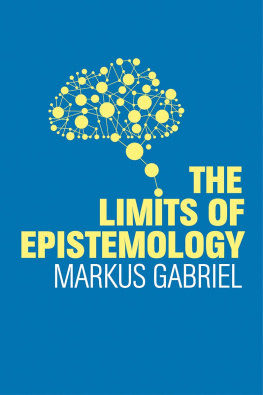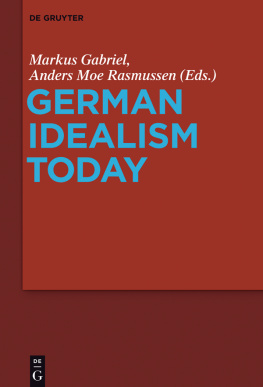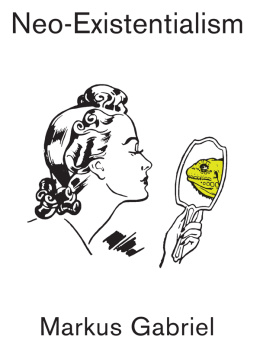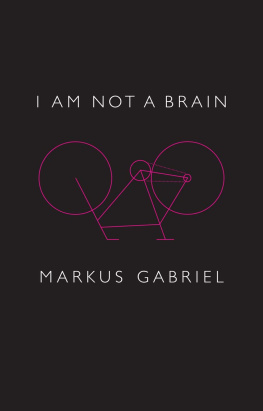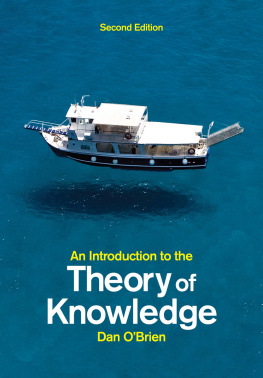
The Limits of Epistemology
Markus Gabriel
Translated by Alex Englander and Markus Gabriel
polity
First published in German as An den Grenzen der Erkenntnistheorie
Verlag Karl Alber GmbH Freiburg, Munich 2008
This English edition Polity Press, 2020
Polity Press
65 Bridge Street
Cambridge CB2 1UR, UK
Polity Press
350 Main Street
Malden, MA 02148, USA
The translation of this work was funded by Geisteswissenschaften International Translation Funding for Humanities and Social Sciences from Germany, a joint initiative of the Fritz Thyssen Foundation, the German Federal Foreign Office, the collecting society VG WORT and the Brsenverein des Deutschen Buchhandels (German Publishers & Booksellers Association).
All rights reserved. Except for the quotation of short passages for the purpose of criticism and review, no part of this publication may be reproduced, stored in a retrieval system or transmitted, in any form or by any means, electronic, mechanical, photocopying, recording or otherwise, without the prior permission of the publisher.
ISBN-13: 978-1-5095-2570-6
A catalogue record for this book is available from the British Library.
Library of Congress Cataloging-in-Publication Data
Names: Gabriel, Markus, 1980- author.
Title: The limits of epistemology / Markus Gabriel.
Other titles: An den Grenzen der Erkenntnistheorie. English
Description: English edition. | Medford, MA : Polity, 2019. | Includes bibliographical references and index.
Identifiers: LCCN 2019005170| ISBN 9781509525669 (hardback) | ISBN 9781509525676 (pbk.)
Subjects: LCSH: Skepticism. | Knowledge, Theory of.
Classification: LCC BD201 .G3313 2019 | DDC 121--dc23 LC record available at https://lccn.loc.gov/2019005170
The publisher has used its best endeavours to ensure that the URLs for external websites referred to in this book are correct and active at the time of going to press. However, the publisher has no responsibility for the websites and can make no guarantee that a site will remain live or that the content is or will remain appropriate.
Every effort has been made to trace all copyright holders, but if any have been inadvertently overlooked the publisher will be pleased to include any necessary credits in any subsequent reprint or edition.
For further information on Polity, visit our website: politybooks.com
Preface to the English Edition
I am particularly pleased that this book, which was published more than a decade ago in German, is now available to an anglophone audience, because I wrote it during my first period as a DAAD (Deutscher Akademische Austauschdienst) postdoctoral researcher at New York University. As Alex Englander began to work on the translation, I decided against updating the book by addressing the (secondary) literature that has been published in the intervening period, as this would drastically change both the course of its arguments and its formulations of central problems. In addition, the work that has appeared over the last decade on issues relevant to the book on objectivity, the metaphysics of idealism and realism, scepticism, and so on is so interesting and far-reaching in its own right that it would take at least another book to do it full justice and to adjust some of my arguments to this altered landscape. Hence, I present the book to the anglophone audience in more or less its original form.
Its point of departure is the simple but all too often ignored fact that epistemology claims knowledge. However, its knowledge claims are not quite ordinary, as its object is knowledge as such (its nature and its limits, as the saying goes). This obvious feature of epistemologys knowledge claims tends to be neglected in contemporary epistemology in favour of an investigation into first-order knowledge. Therefore, epistemology is threatened by a blind spot at the level of its own articulation and justification. As long as epistemology remains unaware of the contexts within which it operates as an intelligible enterprise, we are entitled to entertain some degree of doubt concerning its actual success. Accordingly, the book sets out from the question of what it would take to justify the knowability of the kinds of theses advanced by epistemologists. In other words, it is an exercise in transcendental reflection reflection on the conditions of knowledge-acquisition about knowledge.
Within this framework, it deals with two major issues, which it identifies as hinges of epistemology.
The first issue is the problem of the world as such. This problem arises from the erroneous notion that the world is an object of knowledge. In this context, I endorse a specific version of Kants insight that the world designates at most a regulative idea. In order to make sense of this claim, I distinguish between first-order theories and the metatheory. The role of the metatheory is to make explicit the decisions that guide first-order research, decisions that do not pick out objects in their target domain. The distinction between theory levels serves as an anti-sceptical tool, since it undermines Cartesian-style scepticism about the so-called external world. As a matter of fact, the Cartesian sceptic is on the right track insofar as she implicitly realises that there is no such thing as an external world, but she misconstrues her insight as a commitment to an epistemic asymmetry between an internal world and a domain of external objects potentially beyond our cognitive grasp. To be sure, she is not explicitly aware of the real problem of the world, as is clear from her attempt to treat it as an issue about access: how can we so much as know anything about the external world given that we first need to represent it internally?
The second issue is the problem of fallibility. If knowledge is our term for the good case, there has to be something that can go right or wrong. Otherwise, there would be no conceptual space left for the very idea of a bad case. I suggest that there actually is an element common to both the good and the bad case, namely knowledge claims. Knowledge claims are subject to normative evaluation in light of the question of whether they amount to knowledge. At the same time, I argue that this does not mean that knowledge is, as it were, an aperspectival grasp of facts. I wholeheartedly reject the notion that there could be such a thing as the view from nowhere. To know anything whatsoever presupposes the stability of discursive rationality i.e. of an operation that relies on given parameters that form its context. It simply does not make sense to reboot knowledge claims and to base them on any kind of foundation that (supposedly) transcends the variability of contexts. Much of the book is dedicated to formulating this delicate point without succumbing to the paradoxical, self-undermining expressions associated with the tradition of Pyrrhonian scepticism.
For this reason, I recommend a methodological use of scepticism. Scepticism is integrated into the theory construction of epistemology, which moves from a Cartesian to a Pyrrhonian mode of reflection. In this way, it abandons a model according to which knowledge is a relation between mind and world, or subject and object for that matter. The problem of knowledge should not be couched in terms of a distinction between someones mere attempt to latch onto a mind-independent reality (the world) out there and the concept of the success conditions of said attempt. We need to overcome the assumption that there is a largely inanimate, material universe out there, which serves as the metaphysical foundation of the epistemic objectivity possessed by our mental states. This does not, of course, amount to a denial of specific facts of the matter, including the trivial acknowledgement that we do not make reality up by somehow mentally constituting or socially constructing it. Such a version of overcoming the world (rightly or wrongly associated with Rorty and some time-slices of Putnams work) remains mired in the mindworld problem insofar as it takes the form of a reduction of the world to the mind, of facts to practices, of conditions of truth to conditions of warranted assertability, or what have you.
Next page
